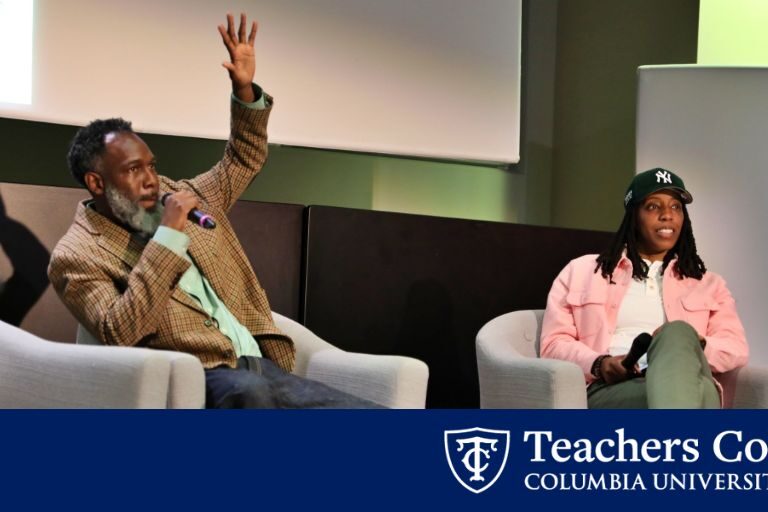Hip-hop’s wide-ranging impact on culture has yet to be fully explored in academic spaces due to gate-keeping and erasure of the very artists responsible for its climb, attested DJ and CUNY professor Todd Craig in a special dialogue with TC’s Bettina Love on March 25.
The conversation — which convened two of the most prominent scholars at the intersection of racial justice and education — celebrated Craig’s latest work, K For The Way: DJ Rhetoric and Literacy for 21st Century Writing Studies, which illustrates how the rhetoric of hip-hop DJs have cultivated an impactful “shared social identity.”
Craig disc-jockeyed before and during his lecture. (Photo courtesy of Smith Learning Theater)
“Who gets to tell the story is critical,” said Craig, who DJ’d his own set to the standing-room only crowd in Smith Learning Theater. “Who gets to tell the story of hip-hop? Is it the English academics who sit in an office in an ivory tower, completely unattached from the culture on the ground, or should it be the people on the ground who are cultivating and innovating and contributing to the culture we’re thinking about?”
For Love, Craig’s work “reminds us of the responsibility of the DJ to inform the crowd as the sound of social justice movements,” in addition to highlighting the strength one must hold when challenging the barriers of traditional scholarship and academia.
Craig and Love. (Photo courtesy of Smith Learning Theater)
“I love a petty scholar who got talent,” joked Love, TC’s William F. Russell Professor in the Curriculum and Teaching department. “A comedian and a good academic stay petty. You need that to do this because it’s always going to be so many people trying to tell you that you don’t belong in these spaces, and the way you retaliate back is through the work.”
Craig and Love’s conversation was hosted by TC’s Racial Literacy Project — an initiative founded and led by faculty member Yolanda Sealey-Ruiz that facilitates dialogue and exchange across the College and greater public in the pursuit of racial justice.
“Thank you for choosing to be students at this critical moment. I hope you continue to keep your hearts and minds open,” said Sealey-Ruiz, Professor of English Education, who called for continued action to support the prosperity of all people in her opening remarks. “Realize that you have to be more than just the students you are…You have to be ready to be a warrior in the times that we are in.”
Craig and Yolanda Sealey-Ruiz, Professor of English Education and founder of the TC Racial Literacy Project. (Photo courtesy of Smith Learning Theater)
Learn more about related scholarship, including:
Bettina Love’s work on racial justice in education
Yolanda Sealey-Ruiz’s community-driven racial solidarity work
Chris Emdin’s #HipHopEd program
Hip-hop’s role in education aligns with a larger exploration of multimodal scholarship — an approach that aims to expand the mediums through which discourse occurs in academic settings, including K-12 schools.
TC Professor Christopher Emdin, a foundational scholar in hip-hop education in his own right, was scheduled to join Love and Craig for the conversation, but was unable to attend due to travel delays.
For Emdin, who began examining the artform’s place in education in 2003, Craig’s work offers an “authentic” look at hip-hop at its purest form — an exploration of roots and self that helps “inform the next generation about who they are.”
That opportunity for self and cultural discovery is precisely what has propelled hip-hop education throughout academia and classrooms over the past 20 years, helping young learners feel more connected to their studies and schools alongside a broader rise in culturally relevant pedagogy.
“Hip-hop artists and educators go viral on social media every few weeks, so the proliferation of this approach to teaching and learning is just mind boggling,” Emdin said. “Work like Todd’s really speaks to the concept that now that we’ve gone wide, we can also go deep. And that’s really beautiful to witness.”
K for the way my DJ cuttin’/Other MC’s, man, you ain’t saying nothin’.
“P.S.K. What Does It Mean?” by Schoolly D, referenced in Craig’s latest book
— Morgan Gilbard
Published Monday, Apr 8, 2024

